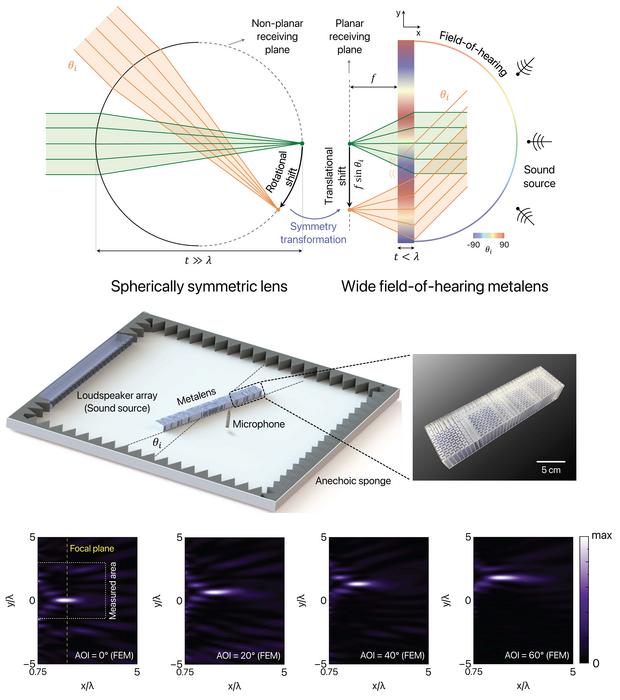Junsuk Rho from the Department of Mechanical Engineering, the Department of Chemical Engineering, and the Department of Electrical Engineering, Dr. Dongwoo Lee from the Department of Mechanical Engineering, and Beomseok Oh, a PhD student, from the Department of Chemical Engineering at Pohang University of Science and Technology (POSTECH) have achieved a breakthrough in surpassing the limitations of traditional acoustic metalenses. They have successfully developed the first wide field-of-hearing metalens. This research has been recently published in the international journal, Nature Communications.

Credit: POSTECH
Junsuk Rho from the Department of Mechanical Engineering, the Department of Chemical Engineering, and the Department of Electrical Engineering, Dr. Dongwoo Lee from the Department of Mechanical Engineering, and Beomseok Oh, a PhD student, from the Department of Chemical Engineering at Pohang University of Science and Technology (POSTECH) have achieved a breakthrough in surpassing the limitations of traditional acoustic metalenses. They have successfully developed the first wide field-of-hearing metalens. This research has been recently published in the international journal, Nature Communications.
Sound waves, originating from vibrations in mediums like gases and liquids, are omnipresent in our daily experiences. Notably, high-frequency ultrasound waves, imperceptible to the human ear, are utilized in medical ultrasound examinations for diagnosing tissues or organs within the body. Consequently, sound waves serve as a vital energy source not only in medicine but also in telecommunications, energy harvesting, imaging, and various other domains. Acoustic lenses are fundamental in all these applications as they are instrumental in accurately focusing sound waves.
Professor Junsuk Rho’s team, renowned for their work on metalens, is attracting acclaim for their advancements in optical metalens for light wave manipulation as well as acoustic metalens for sound control. Metalens, comprised of artificial structures usually smaller than the wavelength of the waves, enables unrestricted manipulation of waves while significantly reducing lens thickness. This research extends the concept of a “wide field-of-view,” currently trending in next-generation AR and VR devices and displays, into the realm of acoustics, opening avenues for novel applications of “wide field-of-hearing” technology.
Wide field-of-hearing measures the breadth of angles through which a lens can display a sound image. Traditional acoustic metalenses suffer from undesired sound distortion (aberration) when waves approach at non-perpendicular angles. The team devised a method to meticulously control the phase of the metalens, ensuring precise focusing of sound waves regardless of their angle of incidence. This marks the first successful achievement and demonstration of a wide field-of-hearing using ultra-thin metalenses, achieving up to 140 degrees of field-of-hearing without sound distortion.
Professor Junsuk Rho of POSTECH stated, “By first demonstrating the significance and necessity of field-of-hearing, we’ve established a new paradigm in the realm of acoustic metalenses.” He added, “We will continue our work to further explore its applications in acoustic imaging and high-sensitivity sensing along with explorations in energy harvesting and submarine monitoring within underwater environments.”
The research was conducted with support from POSCO N.EX.T IMPACT and an organization-specific task of the Korea Research Institute of Ships & Ocean Engineering.
Journal
Nature Communications
Article Title
Wide field-of-hearing metalens for aberration-free sound capture
Article Publication Date
8-Apr-2024



